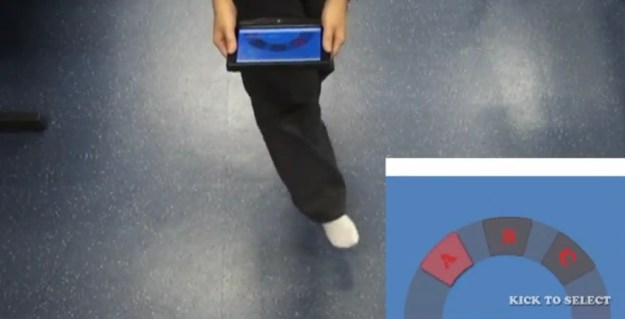
If watching people speak to themselves on Bluetooth headsets wasn’t weird enough, now everyone may start kicking and flailing their legs around to control their smartphone or tablet. A group of researchers at the University of Bristol, UK and the University of Manitoba, Canada want to replace some touch actions on your phone with leg movements and kicks, reports New Scientist.
While there are a number of potential issues with this idea–especially for those who use their devices while walking–Sriram Subramanian, a lead on the project, describes some situations where kicking might be useful. “For example, a mother holding a baby or a shopper carrying bags may not be able to answer their call or skip to the next song on their phone without putting down the baby or the shopping bags,” he said. Of course, we’re not so sure a mother holding a baby should be fiddling with phones at all, let alone kicking her feet while she’s holding the infant.
Users could kick through screens for navigation or play games with kicking gesture technology.
To figure out if the concept would work, the team hooked up a Microsoft Kinect sensor to a tablet. From what they’ve gathered, it’s relatively easy for people to do 5 different kicking gestures, each separated by an angle of 24 degrees. It’s also possible for most people to accurately kick at two distinct speeds. The video below shows off the research done on the subject.
Subramanian doesn’t believe that future devices will use the bulky Kinect setup that he’s using, but he believes that a lot of future shoes may come with built in accelerometers and be able to connect up with devices.
What do you think? Would you ever kick your way through an iPhone? Could this technology actually be useful?


